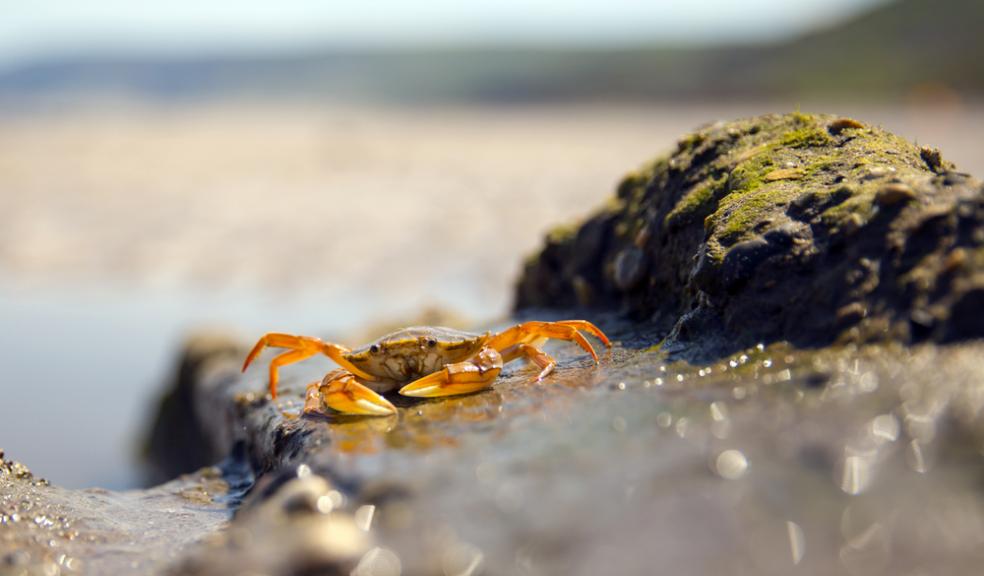
Plymouth-led divers survey wildlife beneath the waves
Secrets of the seabed are being revealed as divers undertake exploratory scientific surveys in a bid to better understand the UK’s marine environment and help protect it for the future.
Five professional divers and marine ecologists, commissioned by The Wildlife Trusts, are gathering evidence and data from areas where existing knowledge about marine habitats is limited.
This summer, Plymouth-based marine scientist Dominic Flint is leading the dive team in recording any interesting finds in five survey areas around England. They are surveying and photographing the sands and gravels, the rock types and forms, the seaweeds and animals attached to the rocks, the crabs and other creatures that crawl over the seabed and the fish that swim above, round and through them.
Richard White, Devon Wildlife Trust's Senior Marine Conservation Officer, said: “By deploying a dive team we hope to be able to propose new areas for inclusion in the third phase of Marine Conservation Zones, which should be designated in 2016.
“Gathering data in the marine environment is notoriously difficult and time-consuming. We hope our activity will help to strengthen the existing evidence base and provide information about areas where little, or nothing, is currently known.
“We have to do this to ensure these places can be included in future discussions over marine protection, and their conservation secured. This will be our last opportunity to secure an ecologically coherent network in England.”
The Wildlife Trusts, at the forefront of practical marine conservation and data submission, is the first non-government organisation to commission a dive team to gather such evidence. All the data gathered will be submitted to Natural England.
All the dives are weather dependent. They have started in the south west of England with plans to move along the Channel and in to the North Sea, where it is hoped new and exciting marine life will be found.
The team's preliminary dive was in Plymouth Sound, with superb video footage captured of the array of marine life beneath the waves just a few hundred metres from Devon's largest city – as seen on BBC Breakfast television this morning.
The team then surveyed The Manacles Marine Conservation Zone, off the Lizard peninsula, in June. It was designated in 2013 for its wide range of habitats: from rocky reefs to vertical rock faces with large cobbles and boulders grading into sandy sediment - as well as to protect the maerl beds, sea-fan anemone, spiny lobster and stalked jellyfish found here. The rocky reef is home to several important and well-known species such as pink sea fan, cup coral and the beautiful jewel anemone. The Manacles was also designated to allow the Maerl beds found there to recover. Maerl is a type of seaweed which forms a hard skeleton and, if suitably protected, forms extensive beds which act as shelter and nursery areas for many other marine animals, including commercially-important species of fish and shellfish. They are very slow to develop and unlikely to return if they are irreparably damaged; as such they are treated as a non-renewable resource vital to sustainable fisheries.
In July, the dive team explored a number of areas within St Ives Bay in Cornwall; an open sandy bay which features the Hayle estuary, framed by rocky headlands and reefs. This is an area known to be important for mobile species from seabirds to bottlenose dolphins, which call in from time to time. During this exploratory dive, the team recorded more than 130 species on and around rich rocky reefs, all teeming with life and colour. The densely encrusted rock forms were swathed in a rainbow carpet of sponges, sea squirts, anemones and seaweeds; providing a playground for nudibranchs, crabs, northern cowrie - a small sea snail - and lobster. Within the sand, they saw burrowing brittlestars, tube anemones and a painted goby. Throughout the dive, the team swam below shoals of bass, sand eels, the odd Ballan Wrasse and a sunfish, the largest bony fish in existence.
Devon Wildlife Trust has been campaigning vigorously for the proper protection of UK seas for many years, securing legal protection for the delicate reefs of Lyme Bay and successfully campaigning for sites within the Tamar Estuary to become a Marine Conservation Zone. With government commitments for protecting the sea yet to be fully met, urgent action is still needed to turn our over-fished, over-exploited, and currently under-protected waters back into a healthy and sustainable environment.













